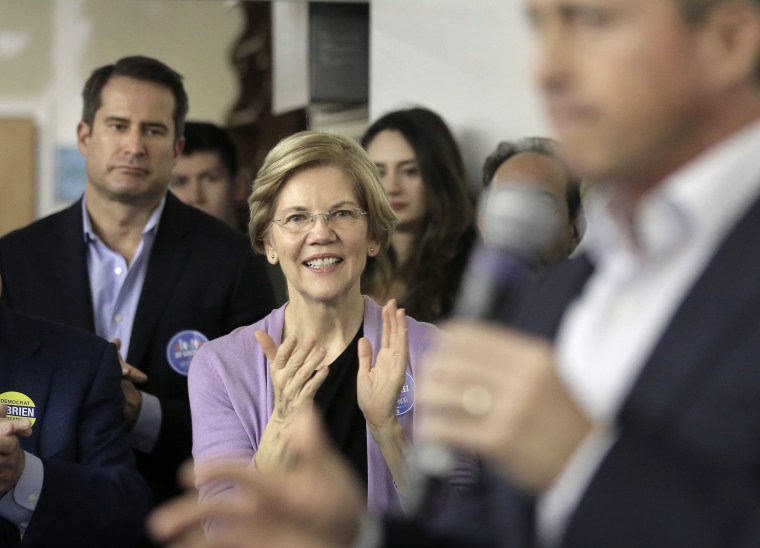WASHINGTON — They're traveling to New Hampshire, interviewing campaign teams, and honing their stump speeches. They're angling to take on a president who made his own 2020 intentions official nearly two years ago.
So why won't the two dozen or so Democrats we all know are likely to run for president just come out and admit it?
It turns out that that, like saying Beetlejuice's name too many times, uttering the magic words “I’m running for president” triggers a host of headaches — in this case, legal and political complications. So most potential candidates won't say it until they have to, even if they aren’t fooling anyone — except maybe the willfully fooled Federal Elections Commission.
“It's a charade played by candidates,” said campaign finance expert Paul S. Ryan of the good government group Common Cause. “Their lawyers have told them, 'Keep your mouth shut, because if you don’t, there are legal ramifications. But the FEC will let us get away with it if you just stay quiet.'”
Of course, nearly every potential 2020 presidential candidate would say they haven’t made a final decision yet, with many sure to add that they're planning to discuss it with their families over the holidays.
But technically, according to Ryan, most of the likely 2020 field should at least tell the FEC they're “testing the waters" for a presidential bid, since they’ve likely met the two requirements: Raising at least $5,000 and taking exploratory steps, such as traveling to early presidential primary states and even calling around to activists there.
In theory, that's what would happen. In practice, however, that rule is almost never followed and regulators have done little over the years to enforce it.
Still, coming out and calling yourself a candidate is a different matter and harder to ignore. The FEC makes it clear that politicians are “no longer testing the waters” once they “refer to themselves as candidates.”
And officially becoming a candidate can be a drag.
Every dollar you raise or spend needs to be accounted for and publicly disclosed, and you can't take more than $2,700 from any one donor for the entire primary campaign. Non-candidates, on the other hand, can use PACs, which have higher contribution limits, to pay for travel and expenses.
Politically, official candidates’ first quarterly fundraising report is a critical show of strength — or the lack thereof — to rivals, donors, and the press, so they often try to launch their campaign close to the start of a quarter to give themselves as much time as possible to raise an impressive number.
So pre-declared candidates are careful to always speak in the subjunctive tense — all “ifs” and “mights” and no “whens” and “wills."
The point is to be freed to set a timeline for strategic reasons, rather than legal ones.
Sometimes, though, they slip up.
Colorado Gov. John Hickenlooper has been teasing a potential presidential bid for over a year, but when he accidentally uttered the magic words in a New Hampshire diner last month, he immediately realized what he had done and backtracked.
"I'm the governor of Colorado, and I'm going to run for president,” he said, according to a reporter for WMUR.
But when a patron reminded Hickenlooper that that was the first time he had said those words, the governor went in for the cleanup: “To be honest, I haven't made the final decision. And if I say I'm absolutely doing it, then there are all kinds of legal ramifications. So, we'll say I'm leaning strongly.”
An adviser later insisted to Colorado Public Radio that Hickenlooper was “joking,” so no legal trip-lines were crossed. "Because he has not made a decision, no further filings or steps are required,” said Brad Komar, who runs Hickenlooper’s PAC.
Eventually, creating a formal campaign becomes a necessity. "[O]ur lawyers said we needed to get that set up as quickly as possible so we could legally begin taking care of the thousand things necessary to get the campaign up and running," Barack Obama's 2008 presidential campaign manager David Plouffe wrote in his book, "The Audacity to Win," about the early days of that effort.
Ryan and other campaign finance watchdogs filed a string of formal complaints against candidates in both parties in 2016 for failing to declare themselves candidates early enough, but the FEC never acted.
In the most egregious case, former Florida Governor Jeb Bush spent the runup to his presidential campaign wooing donors to cut giant checks to a super PAC that went on to do nothing but support his campaign.
Super PACs are prohibited from coordinating with candidates, and candidates can only accept checks of $2,700 or smaller, but since Bush was not technically a candidate at the time, he got away with it.
That held true even after he accidentally told reporters “I'm running for president” instead of his usual phrasing that he was “excited about the possibility of running for president.”
The FEC had not been keen to step in, but that slip up was so blatant that two campaign finance watchdog groups asked the Department of Justice to intervene.
“The fact of his candidacy is so apparent, and so overt, that Bush himself has found it hard to maintain what is really the ongoing charade of his purported non-candidacy,” the heads of the Campaign Legal Center and Democracy 21 wrote in a letter to the Justice Department.
The DOJ didn’t prosecute Bush.
And voters, even do-gooder liberals, may not be interested in this particular bit of campaign finance accountability either.
One 2020 candidate has made a point of not playing games about about his intentions, formally declaring his candidacy early and hoping Democrats would reward his transparency.
"I’m not going have to pretend why I’m in Iowa," former Rep. John Delaney, D-Md., told NBC News when he announced his campaign in July of 2017.
Nearly a year and half later, Delaney is still in the low single digits in polls.

